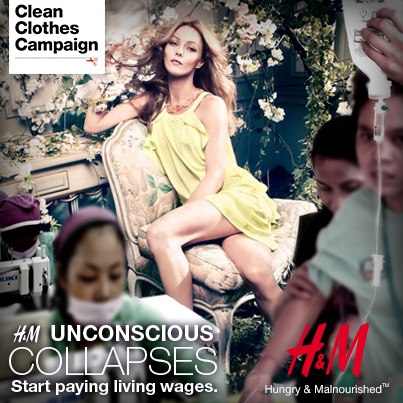
H&M's living wage roadmap needs concrete benchmarks
Clean Clothes Campaign is disappointed that H&M's newly announced Roadmap to a Fair Living Wage fails to clearly state a living wage benchmark, we believe without such a definition it is both impossible to create a 'roadmap' to achieving its payment and similarly impossible to measure the roadmap's success.
However, Clean Clothes Campaign does welcome the roadmap as a positive step forward in the brand's approach to the payment of a fair living wage with some clear goals and deadlines. We believe that a living wage is the cornerstone of decent work and therefore the payment of a living wage must be an inherent and inextricable core element of any truly sustainable corporate accountability framework.
H&M's statement that in order to achieve a fair living wage they are willing to pay more to their suppliers marks an essential commitment at the heart of any wage improvement. It is also encouraging that H&M is committed to improving its purchasing practices to decrease overtime and will develop a tool to measure real wage development. However, we believe that if H&M is truly committed to paying a fair living wage to the people who make their clothes then this roadmap must go further.
Firstly a definition of what they acknowledge to be a fair living wage is needed.
We call on H&M to adopt as a benchmark for a living wage the Asia Floor Wage, in order to be able to work towards a decent wage for all those working in their supply chain in Asia.
H&M's stated commitment to negotiate between factory management and workers is vital in achieving a living wage and is to be applauded.
However, this alone will not achieve 'fair living wages'. The wages that are possible in negotiations at a factory level, when the starting position is a minimum wage of only a quarter or a sixth of a living wage, will never reach an actual living wage sufficient to feed and support a family.
By setting real benchmarks for a living wage, H&M can raise the bar for the industry. Global brands have the power and money, and this money and power is needed to turn things around for workers.
The importance of factory level negotiations is a key inclusion in the roadmap. However we feel H&M should go further in ensuring the inclusion and critical role of local unions.
A first step towards this would be for H&M to sign the Indonesia Freedom of Association Protocol, and look to provide similar safeguarding in the other countries they source from. We also urge H&M to consider broadening their advisory board in order to ensure trade unions have more direct representation.
As H&M state in their introduction to the roadmap “with size comes responsibility”, and as one of the largest clothing brands in the world H&M can and should play a leading role in changing purchasing practices that ultimately lead to a fairer and more sustainable supply chain. In order to take the lead however, H&M need to consider how they would implement a fair living wage when working together with other brands in factories where they are not the sole buyer.
We believe the model factory pilot as outlined in the roadmap is a positive first step, but will only have a significant effect if H&M are able to articulate how they will scale up the project findings with other strategic suppliers. In addition, so-called strategic suppliers, are just one part of the supply chain, to ensure all workers receive a living wage H&M must consider how they will implement changes further down the supply chain, through subcontractors for example, where the risk of lower wage is higher.
Clean Clothes Campaign is cautiously optimistic that H&M are moving in the right direction towards the payment of a living wage and we hope that the next steps in this roadmap will be to provide clear benchmarks for living wage levels and greater clarity on the involvement of local unions and on how the model factory project will be scaled up.
Clean Clothes Campaign is following H&M's work on the payment of a fair living wage with interest, and we hope this initial announcement will be followed by concrete action and improvements.